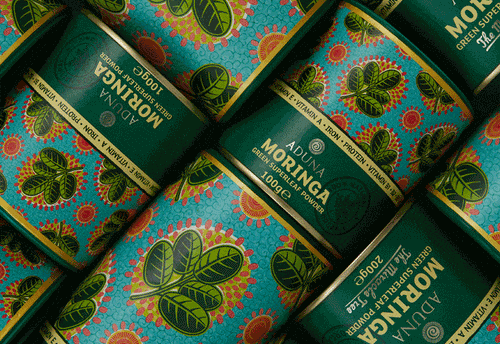
Moringa & Breastfeeding: how moringa can increase breast milk supply
Breast milk: natural newborn nutrition
While we are firm believers that a fed baby is a happy baby, breast milk is often considered to be the best food source for a newborn. Loaded with nutrients and protective antibodies, it contains everything needed to defend against infections, prevent allergies and support babies' delicate immune systems and overall health.Some women are unable to, or choose not to, breastfeed for a variety of reasons and of course formula milk is a healthy alternative. Other women would like to breastfeed but experience difficulties producing enough milk to sufficiently nourish their babies, so end up weaning early or using formula to top up their supply.
For mothers looking to increase breast milk supply in a safe, organic and natural way, help may be found in the leaf of the mighty moringa tree.

Moringa the super-supplement for new mums
Native to Asia and Africa, the moringa tree (commonly known as 'The Miracle Tree') has long been prized for its medicinal properties. For centuries it has been used to improve nutrition in infants and breastfeeding mothers.
One of the most nutrient-dense foods in the world, moringa leaves are rich in 5 essential vitamins & minerals including iron, calcium, vitamins A, E & K. It is also a complete source of plant protein with all 9 essential amino acids, high in fibre and rich in antioxidants.
All of these nutrients but particularly protein, iron, vitamin K and calcium are needed in good supply for new mums, and especially for those who are breastfeeding.
- Iron is essential for the reduction of tiredness and fatigue - something experienced by the vast majority of new parents. New mums are often deficient in iron as they can lose blood during birth, which can leave them feeling exhausted and weak. A single serving of Moringa Powder contains 46.8% of your iron requirement - so mixing some up into a green smoothie with other leafy greens or taking a shot mixed in apple juice is a great natural way tofeel more energised.
- Calcium is important for strong bones and teeth for both mum and baby. New borns suck up a lot of their mum's calcium supply when breastfeeding so mothers need to supplement to ensure both themselves and their babies are getting the calcium they need for optimum health and growth.
- Vitamin K contributes to normal blood clotting and is particularly important for new mums and their babies. Vitamin K is actually given to newborns via an injection or oral tablet when they are born. Vitamin K is also important for new mums post birth who can often be bleeding heavily.
Moringa and breast milk: increase your supply
For breastfeeding mothers, undoubtedly one of the most amazing benefits of moringa is that it has been scientifically proven to increase breast milk supply.
Moringa leaves are a natural galactagogue - a substance that promotes or increases the flow of a mother's milk. It has been used since ancient times to boost breast milk supply as well as providing a source of nourishment for babies and mums alike.
In 2013, The Philippines Journal of Pediatrics published a report which reviewed the findings of five scientific studies examining moringa and its impact on breast milk supply.
The report reviewed all the published data from five small randomised controlled studies and found that Moringa produces an increase in breast milk volume compared to placebo.
A second study evaluating the use of moringa to increase volume of breast milk among mothers of preterm infants, had similar results.
There have been no known reported side effects of consuming moringa whilst breastfeeding and most women report only benefits - increased breast milk supply, energy and a stronger immune system.
If you are on medication, pregnant or trying to conceive however, we recommend speaking to your GP before taking our moringa products.
What does Moringa taste like?
Moringa has a delicious earthy green taste similar to spinach or matcha green tea. Mix into savoury dishes, green smoothies and juices, apple juice or coconut water.
Shop The Aduna Moringa range:
-
Aduna Moringa Powder - 100% organic moringa leaves, dried and filtered to make a pure powder. With a vibrant green colour and a delicious spinachy taste, use to boost green smoothies, juices or as a "superfood seasoning" for savoury dishes. Start with 1/2-1 teaspoon a day before building up to 2-4 teaspoons.
-
Aduna Moringa Capsules - made using the same best-selling powder for an easy and convenient way to enjoy the benefits of moringa on-the-go. Each serving contains 1500mg of pure moringa powder and every bottle provides a 2 months supply.
- Aduna Mint, Nettle & Moringa Super Tea - an award-winning infusion of peppermint and nettle super-charged with moringa, this super-cleansing brew is a refreshing, delicious digestif.
Buy online today and receive free delivery on all orders over £35 in the UK and £50 internationally. Sign up to our newsletter and receive a 15% off discount code direct to your inbox.
Or visit our store locator to find your nearest retailer (we sell in 18 countries around the world).
Choosing the right Moringa
Not all moringa is made equal and it is important to buy from a trusted, certified brand. Aduna is certified by the UK's leading organic certification body The Soil Association. Our products are made under the highest international quality standards and undergo rigirous microbial anlaysis to ensure they are completely safe for you and your children.
Sustainable livelihoods for small-scale producers
Aduna is an Africa-inspired health food brand and social business. We source our organic moringa directly from small-scale producers, creating life-changing sustainable income flows. By buying Aduna Moringa, you will be directly supporting women in rural Africa and helping give them the means to provide for their families.
Find out more about our social mission.
Sources
The Philippine Journal of Pediatrics, Vol 61, No. 2, King KS et al, December 2012
The Phillippine Journal of Pediatrics, Vol 49, J.B.V. Mantaring & G.Z. David, January-March 2000







